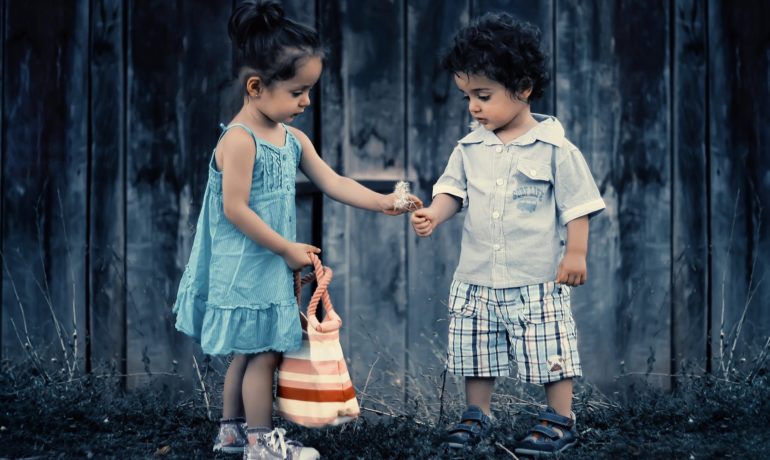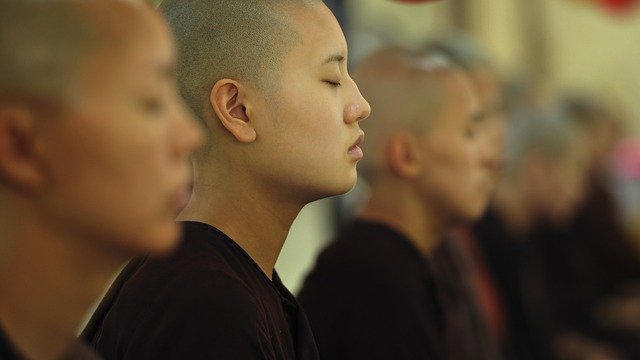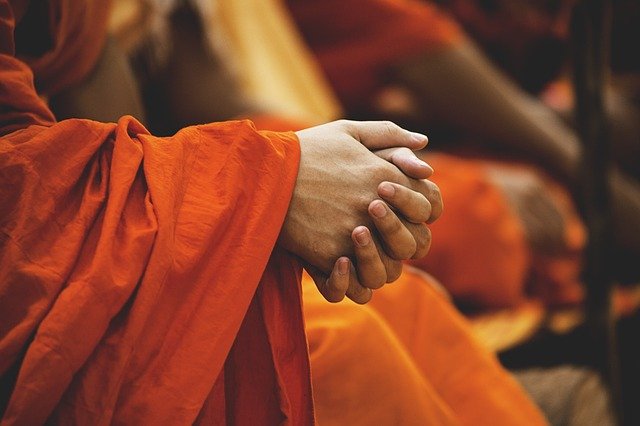The ten perfections in Buddhism are virtues to be developed and perfected on the spiritual path. The first of the ten perfections is generosity or dana in Pali. It is followed by moral conduct (sila), renunciation (nekkhamma), wisdom (panna), effort (viriya), patience (khanti), truthfulness (sacca), determination (adhitthana), loving-kindness (metta), and equanimity (upekkha). The virtue of generosity, dana parami, is the basis of all the other perfections.
Giving, a tradition in Thailand
Where I live in Thailand, people wake up early in the morning, they cook rice, curries, and whatever they have. They put the food in the plastic bag, go out to wait at 6 am in the morning to wait for the monks and the nuns to offer food to them. Usually, it is the elders who give alms good as they are at home to care for the family. It is a really sweet sight to see the adults holding the children’s hands to give alms. When the children grow up, they also want to put food into the monks’ bowl. It is their training early in life. Their first wholesome deed in the morning is to give.
The monks and nuns also give back to the lay community who support them with food, shelter, medicine, and robes. What monastics do is dhamma dana – sharing dhamma with the laypeople. We have to practice in order to share the dhamma. By sharing the dhamma, monastics help the lay people know where suffering comes from and learn to live in peace. Giving food only ends temporal suffering, but the knowledge of dhamma ends suffering for good.
Three levels of Generosity
There are three levels of dana parami.
- Dana parami means we help beings with material things such as food, shelter, clothing, and medicines and also physical help and knowledge.
- Dana upaparami is giving parts of our body to help someone. The most common practice by us is blood donation. We donate blood to help others overcome their illness or to save their lives. We also give parts of our body, such as a kidney. Or even donating this body after death to help others survive. It’s not easy for us to do that.
- The hardest is Dana paramatta parami, which is giving your life for the benefit of others. Giving your life to protect others. The Buddha as a Bodhisattva gave his life in uncountable lifetimes. There are many stories of the Buddha’s past lives known as Jataka stories before he attained Buddhahood where he had given his life to benefit others.
Giving our lives to others
In one of these Jataka stories, the Bodhisattva consciously decided to be reborn as an animal to help the animal realm. He was reborn as a rabbit. He had a brother rabbit and that was Bodhisattva Maitreya – the future Buddha. They were happy little rabbits hopping on the grass when they came upon a big hole in the earth. In the hole was a tigress with her baby cubs. They saw the tigress was starving and she was on the verge of eating her cubs but she could not.
It is said that each Buddha has one main perfection. Gautama Bodhisattva’s main perfection was wisdom. Wisdom is compared to a very sharp sword that can cut through ignorance very swiftly. When Gautama Bodhisattva saw the tigress, he immediately jumped in to help the tigress and cubs to survive. Maitreya Bodhisattva on the other hand didn’t jump as his main perfection is effort (viriya). He went to the edge of the forest to clean himself perfectly, rubbing his rabbit body in jasmine flower before he jumped into the hole. With viriya as his main perfection, he could not just give dana, but he had to give it in the most beautiful way. If you want to be a Buddha, you have to give your life many, many times to benefit others. It isn’t necessary if you want to be an enlightened arahant.
There are three ways of giving.
- The lowest level is giving like giving to a beggar. This level of giving is giving things you don’t want anymore.
- The second level is giving like a friend, to a brother, or a sister. You give away knowledge or things you have – it is easy because you love them.
- The third level is to give like a king. You give wholeheartedly to all beings living in your country because you want all of them to live in a good and suitable way.
The intention behind giving
Intention is also important when practicing dana parami. We shouldn’t give because we want something in return. Or to give out of spite to shame others, that is not the right intention. Or you may give out of fear because someone forces you to give something or you fear others will think negatively about you if you do not give. We should try to avoid these kinds of intentions.
Here in Thailand, many people come and give because they know they will get something in return. They know about the law of karma. Some people give incense, flowers, and donations hoping to win the lottery. But even if you have an intention like that, still practice giving. Like everything else we do in our lives, it is to train our minds. In giving, are training in dana parami. Giving frequently will one day become a natural habit of your mind. Don’t give up just because your intention is not yet 100% pure.
We also have to contemplate the object we give. For example, we should not gift weapons, drugs or poison because these things cause endless suffering. The timing of the gift is also important. A winter coat given during summer would not be useful.
The receiver of the gift
Another thing we have to be aware of is the receiver. If the receiver has a pure mind, there is much good karma. If the receiver’s mind is impure, there is not much good karma from dana.
A Brahmin once asked the Buddha how to get the best results through giving. The Buddha compared giving to planting a rice field. You will not harvest rice in a rice field full of weeds. Similarly, a rice field with no weeds produces a good harvest of rice. The rice field is compared to the mind of the receiver, and the farmer as the giver. If the receiver’s mind is pure, you get good results from that dana.
If money is given to someone who begs for money so that he can drink, the money given to him will be spent on alcohol. He may go home to beat his wife after drinking. But this does not mean we do not give to the poor just because their minds are not pure. We give to help them survive, so they may get a chance in life. The Buddha taught us not to give in order to gain something in return.
When giving to those with a pure mind, wisdom, and compassion, they benefit their communities. Their mind is usually set to be very helpful, to their environment, their country, and the whole world. They bring more happiness and peace into this world. Supporting them is of very high value.
Wisdom arising from generosity
Giving reduces our greed and stinginess. We learn to think of others’ well-being and that has a good influence on our surroundings. Children see our examples and they want to imitate them. A lot of joy arises even if we just give a smile. Smiling brings happiness to our surroundings. If we are stingy, it also influences those around us. The children may imitate stinginess and become selfish. Our environment imitates our behavior. There will be fights over possessions and wars. That’s all because of our greed and inability to share.
On the other hand, dana parami will also inspire our family, friends, and the environment. People will be more concerned about the well-being of others. This transforms our minds.
Practicing dana produces a lot of good in the world. By accumulating things, we are not wise because all things are impermanent. Our lives are impermanent, we cannot take things with us when we die, someone else will take over. We only own what we give. What we keep belongs to others.



